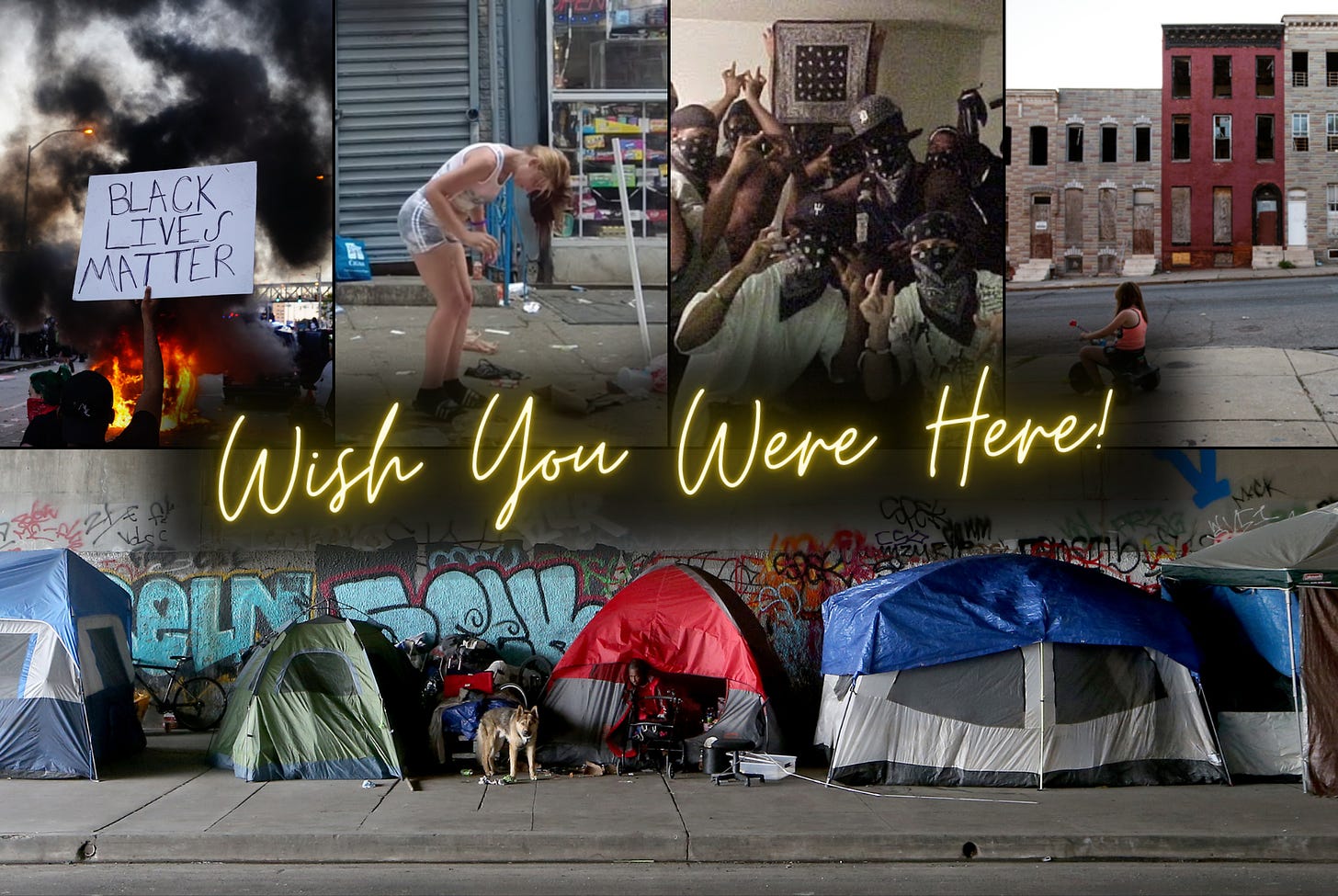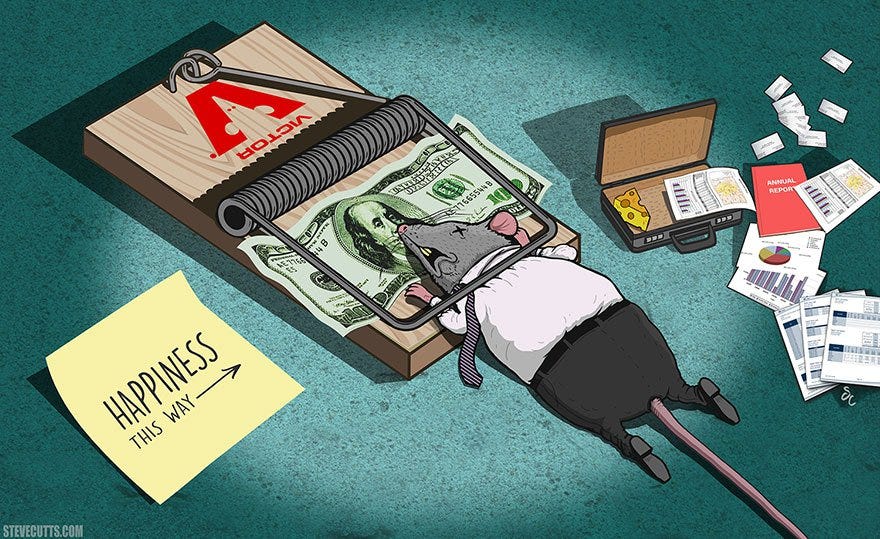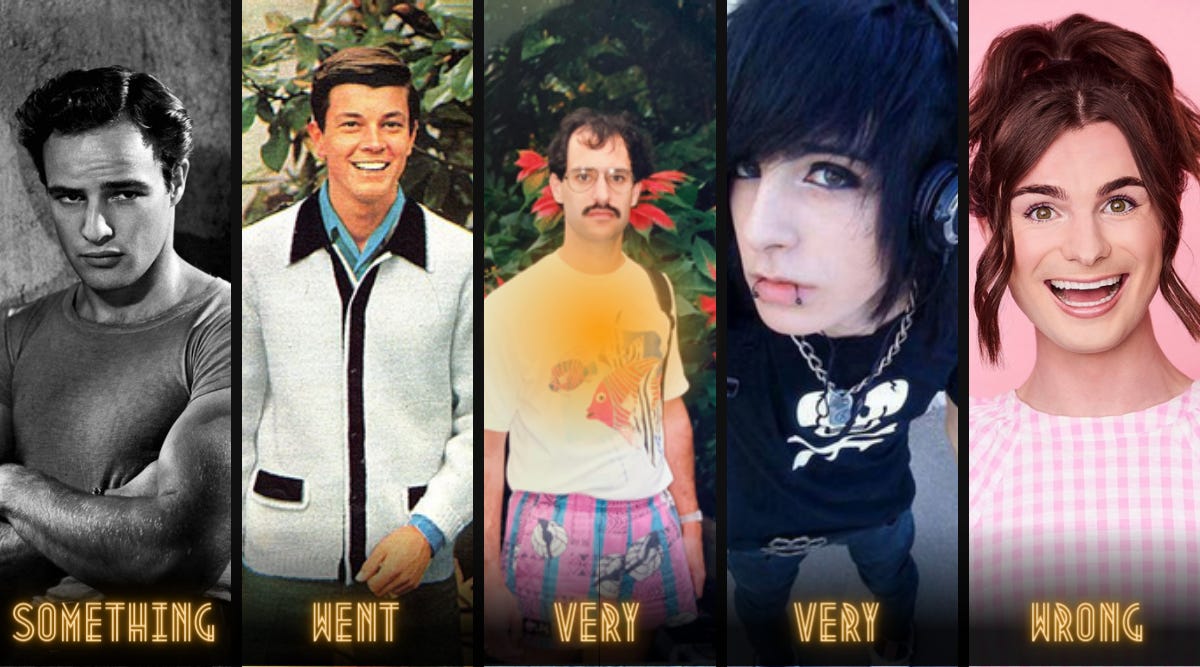The Insanity of Cities: How Urban Life Breeds the Progressive Mind-Virus
The Insanity of Cities: How Urban Life Breeds the Progressive Mind-Virus
"Men, it has been well said, think in herds; it will be seen that they go mad in herds, while they only recover their senses slowly, one by one." - Charles MacKay, Scottish author and poet (1814-1889)
To take a stroll through downtown L.A., Chicago, Detroit, Philadelphia, or perhaps more daring still, to venture into the dark heart of the NYC subway system, is to be intimately acquainted with both the heartbreaking sights and stomach-clenching stenches which characterize the modern American metropolis. From the multi-mile-long homeless encampments dimpling Portland to the feces-strewn streets of San Francisco – from Seattle’s shrieking secessionists to the fentanyl epidemic ravaging St. Louis – there are now sizeable segments of once-great US cities that are all but indistinguishable from a third-world hellscape, and yet no matter how obvious these uniquely urban ills have become, still inhabitants cling to an unwavering faith in the policies which helped precipitate them.
And that, as renowned plagiarist, pervert, and one-time resident of New Jersey Albert Einstein famously noted, is the very definition of insanity. Understand, dear reader, this is not meant as some trite rebuke. Looking on from the outside, typically in half-amused, half-horrified bewilderment, it does indeed appear that major population centers across the country, almost without exception or even hint of hyperbole, are deep in the grips of a collective psychosis – a psychosis precipitated by the nakedly unnatural conditions of big city life:
The Prevalence of Suffering
Consider, if you will, a day in the life of your average urbanite. Upon stepping out of their eye-wateringly expensive studio apartment, Fitbit fully charged and ready to roll, he, she, and as we are increasingly expected to believe xir, will often encounter several manifestations of human tragedy before picking up their first pumpkin spiced latte of the morning. That is not to say they are bereft of sympathy. Rather, over time and with enough exposure, the sheer ubiquitousness of misery necessitates some degree of tactical indifference, a defense mechanism which has come to represent a core feature of urban existence.
Ambulance sirens scarcely register as they squeal past the office windows.
The sound of gunshots are subsumed within the larger cacophony of the city.
Children step over used syringes on their way home from school, mental illness endemic, eye contact with the needy reflexively and diligently averted.
Amid this profusion of hardships, it is perhaps unsurprising that progressive politics almost invariably emerge. After all, while rural or small-town communities might band together in order to help those requiring it, whether through their church or local charity organization, the problems confronting the city-dweller are so pervasive that there can seem little sense in risking one’s own wellbeing in the hope of assuaging an infinitesimal fraction of them, government offering (or at least, promising) a safer, far more impactful solution. Not that a vote for AOC or Bernie Sanders is purely altruistic. Whatever empathy the urbanite may harbor toward their block’s resident crackhead, eventually the daily requests for change (and of course the accompanying odor) will taint this empathy with resentment, progressives vowing not just to tackle such issues with compassion, but also, in a manner much more direct than others on the ballot, to remove them from the landscape entirely.
Unrelenting Competition
While city slickers will commonly cite the proximity of bars, museums, art galleries, and international cuisine among the factors that prompted them to live where they do, ultimately, what first attracts most is the prospect of not simply a job, but a career. These, by their very nature, are competitive. The cost of merely existing in Manhattan or DC is enough to explain the cut-throat culture such places are synonymous with, however, the rivalry embedded within major metropolises runs deeper still. Regardless if one is seeking a parking spot, a seat on the subway, or just trying to make themselves heard above the hubbub, urbanites frequently find themselves locked in a battle for both space and resources – a lifestyle which, for many, can prove intolerably exhausting.
The reader is no doubt familiar with the consequences. As documented by John Calhoun in his oft-referenced “Mouse Utopia Experiment,” forcing subjects to live in closer quarters than they organically would results in a considerable portion withdrawing from the group, a pattern which holds true – arguably even truer – for humans. The hikikomori of Japan are perhaps the most explicit example of this and yet, in recent years, equivalent phenomenon have materialized across the west in the form of both NEETs and the so-called Doomers. On top of this, are the countless millions who spend entire weekends holed up in their apartment, lost in the censorship-ridden sinkhole of social media or the leftist dogma of the entertainment industry, great swathes of urban America already acclimated to the atomized, pod-imprisoned future Schwab, Gates, and Harari have planned.
Race
Despite the progressive and patently absurd claim that “diversity is our strength,” for those compelled to endure the day-to-day actuality of this mantra, in areas blighted by poverty, violence, and non-existent social cohesion, this is a far more tenuous fiction to maintain. Take Houston, for instance. Officially ranked as the most ethnically diverse city in America, so too has it earned the more dubious title as Texas’s most crime-ridden (as well as breaking the top twenty in the country as a whole). Of course, what those lauding the creation of this long strived-for smorgasbord neglect to mention is the segregation which defines Houston’s neighborhoods, a correlation that even the likes of Nate Silver have been forced to acknowledge, is repeated across virtually every state in the union.
Now, it would be all-too-easy to get bogged down in the myriad of reasons why, when left unmolested by government, people choose - indeed, overwhelmingly choose - to form communities with those they have most in common. Mention the deterioration of US race relations and you’ll be greeted with an array of comparably hysterical opinions, liberals’ both the loudest and least illuminating, and yet the one thing we can all agree on is that now, maybe more than ever, the topic has the capacity to make everyone very, very nervous. Living in the middle of this pressure cooker, it is hardly surprising that inhabitants of large urban centers would wish to turn down the heat, their dutifully repeated cries for “equity” and demands to redress “historical grievances” nothing more than a desperate plea to erase the reality of race from their lives.
The Feminizing Effect of Convenience
For a vast majority of humanity’s time on earth, even the most basic essentials of life constituted a hard won victory - vegetables planted months before consumption, meat hunted or raised from birth; beautiful things painted, composed, and painstakingly chiseled from stone. But no longer. In the wackadoodle world of 2023, and in particular, the beating heart of metropolitan America, food, sex, and pretty much everything else that once propelled our species forward has become gluttonously, deadeningly abundant.
The benefits of this seem obvious. Released from the constant struggle for survival, those capable of pursuing loftier goals have, at least in theory, been afforded the opportunity to do so. But does this really sound like your archetypal urbanite? Aside from the fact that, when granted a wealth of free time, most people either squander it or succumb to their basest instincts, mankind’s mastery over his environment has also rendered obsolete those once responsible for taming it, namely men. One need only glance around any West Coast cesspit to appreciate how transformative this mass emasculation has been, testosterone-deficiency a well-documented component of leftist ideation. Sifting through a dating pool comprised of cucks, soyboys, and other assorted beta males, it is difficult to blame city-dwelling women for assuming more masculine qualities to compensate, this subversion of the natural order accelerating both the rapidly declining birth rate alongside society’s face-first descent into progressivism.
The Human Plague
By now it must be clear to everyone, and certainly anyone who has been paying attention throughout the last three years, that the modern American left, under instruction from their globalist puppetmasters, is embarked on a flagrantly anti-human agenda. Neo-Malthusian thought leaders such as Bill Gates, Albert Bourla, and David Attenborough have long ago abandoned any effort to conceal their genocidal intentions – worldwide depopulation executed through a program of taxpayer-funded abortion, state-encouraged suicide, mandatory vaccination, and the incremental, generation-by-generation erasure of human sexuality.
Mercifully, rural folk have an innate immunity to such propaganda. Residing in much more sparsely occupied areas, breathing in the good old clean country air, they can see scant evidence of the climate apocalypse Al Gore insists, after decades of unrealized prophecies, is right around the corner. Cities, on the other hand, contain a far more impressionable audience. Spending their lives in near perpetual gridlock, it is almost understandable why inhabitants have grown amenable to the notion that the planet could do without quite so many of us - littering, vandalism, and violent crime all contributing to a metropolitan misanthropy the establishment are keen to exacerbate. Through concepts like “15-minute cities” and Saudi Arabia’s “The Line,” they intend to use humanity’s growing disdain for itself to justify reducing us to the level of livestock, promises of efficient public transportation, futuristic amenities, unending leisure time, and environmental harmony merely acting as bait.
Needless to say, reality will look altogether different. Housed in privacy-denying cellblocks, inside neighborhoods far more densely populated than any within America today, inmates of these immense, digital prison-ghettos will soon find the cutting-edge Eden they signed up for devolved into an ultra-modern version of the Bronx, a Compton covered in QR codes, or Baltimore 2.0. By then, of course, it will be all too late. Held captive not just by the gleaming glass walls of utopia but also the invisible chains of a social credit system, few will possess either the means or the resolve to defy the diktats of the algorithm and yet, no matter how despotic things become, most won’t even think of escape. Much like the residents of present day New York, Chicago, or Oakland, they will instead seek to remedy their woes by pleading for their jailers to tyrannize them still further, exhibiting as they do, all the madness and myopia induced by big city life.
Source: Midnight At The Matinee





Comments
Post a Comment